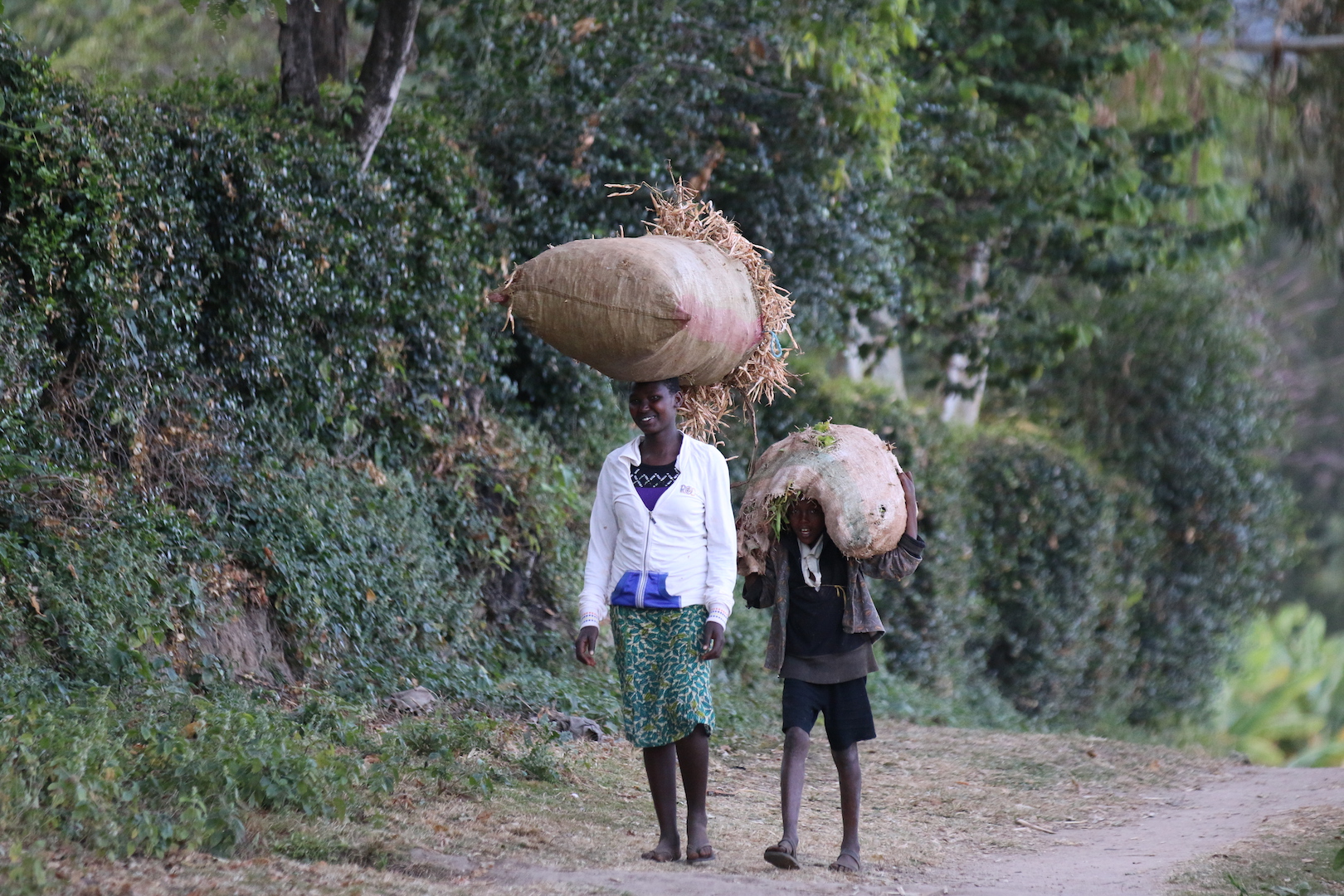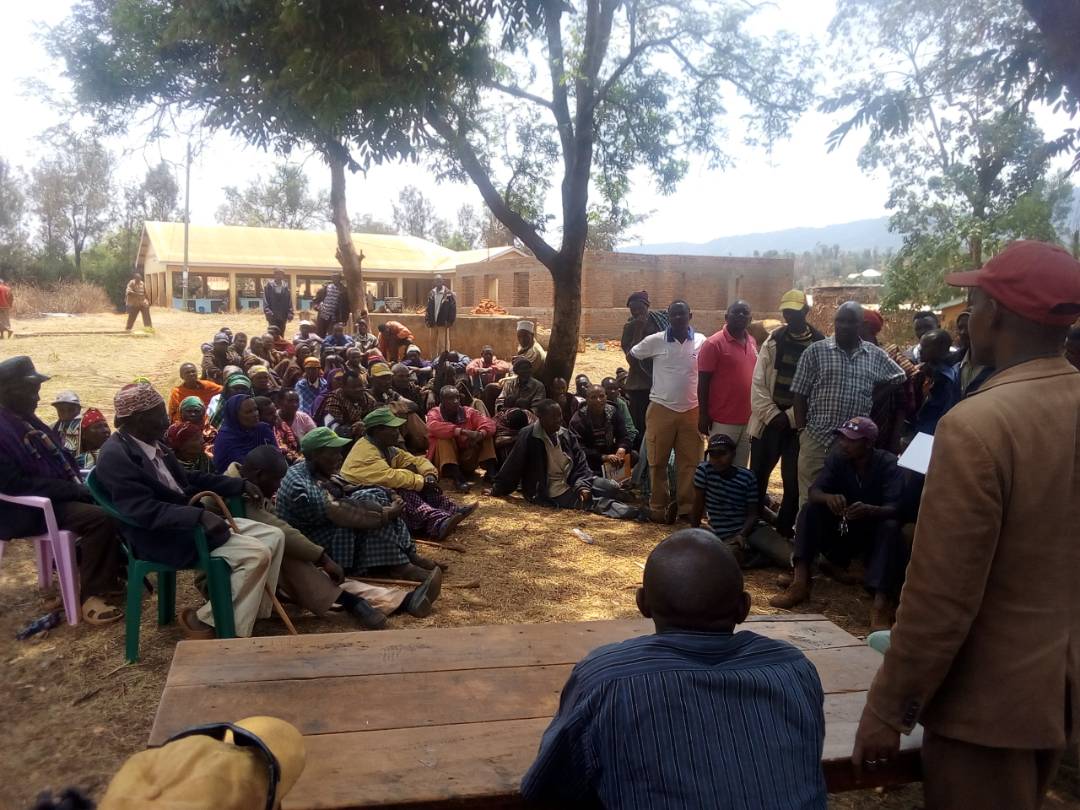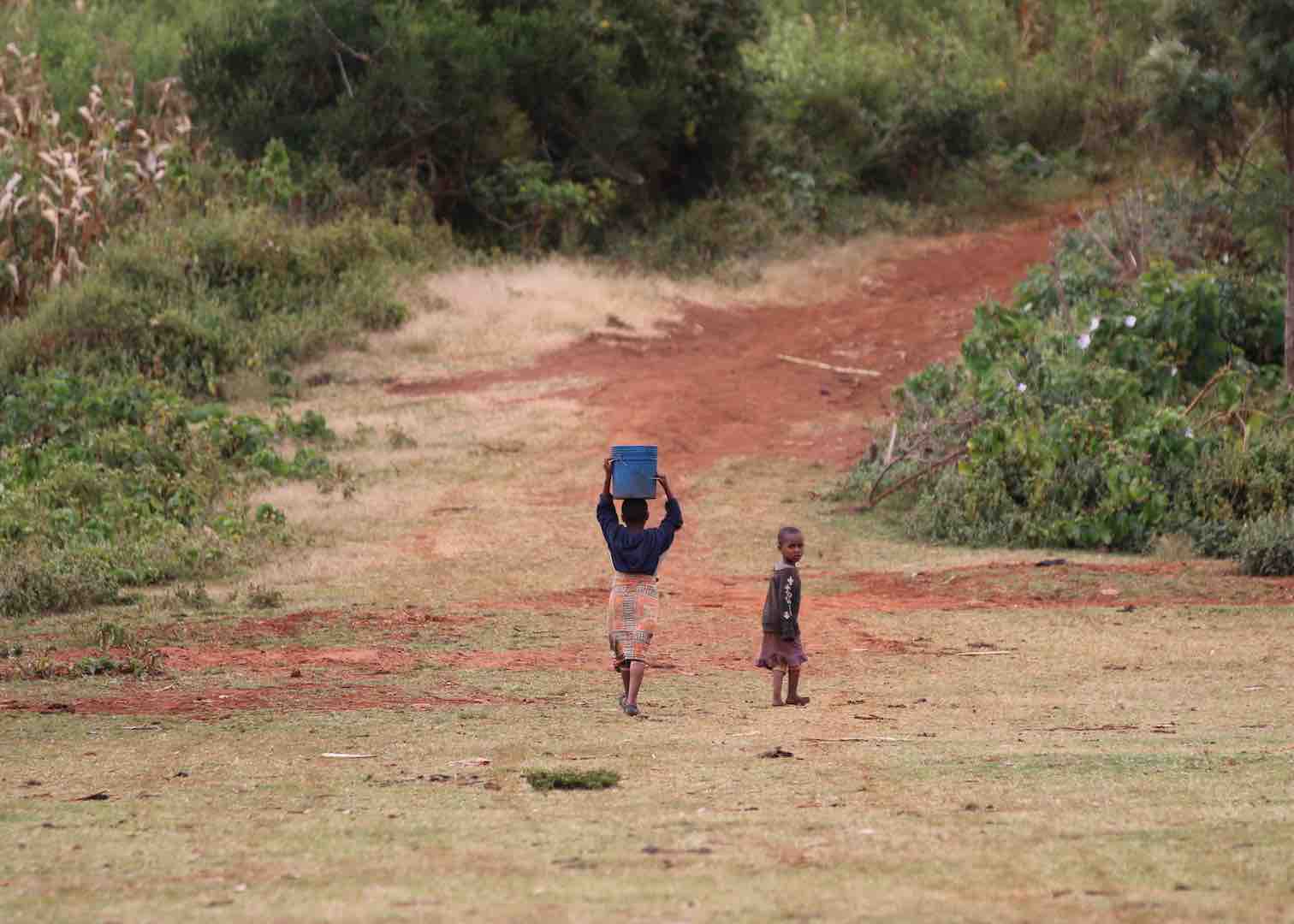
Community
The Communities that Partner with Karimu
Almost all the people Karimu serves in northeastern Tanzania are subsistence farmers, who also raise chickens, cows, goats, and pigs to help feed their families. While the warm, sometimes humid climate and rich soil can accommodate any crop, maize, beans, bananas, and tomatoes are dominant. The more prosperous or ambitious farmers also grow tropical fruits, but their prosperity is relative: all farmers transport their crops by oxcart or by walking and carrying their harvest. Even teachers, whose salaries—extremely modest by the standards of rich countries—greatly exceed the earnings of most locals, devote many hours to raising crops and livestock on their small properties.


Most people belong to the Iraqw tribe and, except for the very oldest, speak Swahili, though most Iraqw also speak their tribal language. The great majority of Iraqw practice Catholicism, with smaller numbers identifying as Lutheran or Pentecostal. The population also includes small numbers of Sunni and Shia Muslims. The Iraqw have been known in Tanzania for mixing monotheism with tribal beliefs and practices often dismissed by the government and those outside of the culture as “primitive.” The Iraqw have also had a reputation for being among the most resistant of Tanzania’s 120 tribes to what in Swahili is called maendeleo, development or modernization.
Like claims about minority populations everywhere, the criticism of the Iraqw dissolves upon close inspection. For fifteen years, Karimu has enjoyed the warm hospitality and eager cooperation of the Iraqw. They have consistently shown gratitude and commitment to work as partners with Karimu.

As in poor agricultural communities everywhere, families are large so that many hands can share the work. Primary school (grades 1-7) is mandatory and free, but many families struggle to cover the cost of school uniforms and other materials, and to compensate for household or farm labor that is lost when a child attends school.

Since its 2008 founding, Karimu has worked in the Babati District of Tanzania’s Manyara Region. Tanzanian districts are divided into administrative areas called wards, wards are divided into villages, and villages are divided into sub-villages. Villages and sub-villages are governed democratically, with the citizens electing representatives to the village and sub-village councils. Explore our interactive map of Ayalagaya Ward.
Karimu began working in Dareda Kati, the largest village in Ayalagaya Ward, but gradually moved into Ayalagaya’s other villages, Haysam and Gajal. Ayalagaya Ward encompasses some 50 square kilometers (19 square miles) and 2,400 households. Karimu’s five-year strategic plan, developed in 2018, set out the means to alleviate poverty in Ayalagaya, successfully exit the ward, and then, in 2019, start applying its successful model to neighboring Arri Ward, whose 120 square kilometers (43 square miles) are home to 3,300 households.
The Ayalagaya Ward has three villages. Villages in Tanzania represent large areas of land which are administered together. These villages are divided into sub-villages which, in turn, tend to represent an identifiable set of households. Together, Dareda Kati, Haysam, and Gajal have 13 sub-villages. Sub-villages as well as villages are democratically structured. The people elect representatives to serve on the sub-village and village councils that deliberate before making most of the decisions for their communities. The Arri Ward has 7 villages: Dudiye, Arri, Endasago, Dohom, Sharmo, Managha, Tsaayo. Together they have 23 sub-villages.

In both Ayalagaya and Arri, the elderly, who command a respect that astonishes Western visitors, are vital to maintaining family stability. They teach the young not only a depth of community commitment that also startles outsiders, but the traditional songs and dances featured at public gatherings, and at the private gatherings in homes to which Karimu volunteers are often invited. The elderly tend to approve of education, while nevertheless recognizing that it may lead to far-reaching changes.

Whatever the older Iraqw may think of the change brought by maendeleo, none of them wish that the old ways of accessing water would continue. In a place where almost everyone travels on foot, it has not been unusual for a child to walk two hours to school or for a pregnant woman to walk two hours to medical care. The distance from a home to a water source could also be great, and the burden of fetching water typically fell upon women and girls. One needs little imagination to infer the effects of this labor on girls who wanted to go to school.

Water has never been lacking in Ayalagaya and Arri because of generous seasonal rainfalls, easily collected from the Rift Valley escarpment that overhangs both wards. Nevertheless access to clean and free water was all but non-existent when Karimu arrived. In 2019 Karimu completed the Ayalagaya Ward water project (https://www.karimufoundation.org/our-projects/2019-ayalagaya-water-resources), distributing gravity-driven clean water to more than 90 water points, each with two faucets. Today, no one in Ayalagaya has to walk more than 500 meters to collect water—and Karimu is making rapid progress on a new water project to bring the same benefits to Arri Ward. You can view the locations of the water points on our interactive map.
The need for Karimu to step in because of the Tanzanian government’s failure to address its citizens’ problems was explained by Karimu’s great friend Julian Page, of Livingstone Tanzania Trust, in this YouTube clip from 2009.
What Julian does not have time to say is that the Tanzanian government depends on the wealth of its people as a tax base. But the World Bank measures Tanzania’s per capita GDP as slightly more than a thousand U.S. dollars, double that of Afghanistan but about one-sixtieth that of the United States.
Karimu has partnered with local and regional government officials to ensure that all projects will be maintained so that the impact of Karimu projects will result in a better future for the generations to come. Read more about our approach here.
The Communities that Partner with Karimu
Almost all the people Karimu serves in northeastern Tanzania are subsistence farmers, who also raise chickens, cows, goats, and pigs to help feed their families. While the warm, sometimes humid climate and rich soil can accommodate any crop, maize, beans, bananas, and tomatoes are dominant. The more prosperous or ambitious farmers also grow tropical fruits, but their prosperity is relative: all farmers transport their crops by oxcart or by walking and carrying their harvest. Even teachers, whose salaries—extremely modest by the standards of rich countries—greatly exceed the earnings of most locals, devote many hours to raising crops and livestock on their small properties.


Most people belong to the Iraqw tribe and, except for the very oldest, speak Swahili, though most Iraqw also speak their tribal language. The great majority of Iraqw practice Catholicism, with smaller numbers identifying as Lutheran or Pentecostal. The population also includes small numbers of Sunni and Shia Muslims. The Iraqw have been known in Tanzania for mixing monotheism with tribal beliefs and practices often dismissed by the government and those outside of the culture as “primitive.” The Iraqw have also had a reputation for being among the most resistant of Tanzania’s 120 tribes to what in Swahili is called maendeleo, development or modernization.
Like claims about minority populations everywhere, the criticism of the Iraqw dissolves upon close inspection. For fifteen years, Karimu has enjoyed the warm hospitality and eager cooperation of the Iraqw. They have consistently shown gratitude and commitment to work as partners with Karimu.

As in poor agricultural communities everywhere, families are large so that many hands can share the work. Primary school (grades 1-7) is mandatory and free, but many families struggle to cover the cost of school uniforms and other materials, and to compensate for household or farm labor that is lost when a child attends school.

Since its 2008 founding, Karimu has worked in the Babati District of Tanzania’s Manyara Region. Tanzanian districts are divided into administrative areas called wards, wards are divided into villages, and villages are divided into sub-villages. Villages and sub-villages are governed democratically, with the citizens electing representatives to the village and sub-village councils. Explore our interactive map of Ayalagaya Ward.
Karimu began working in Dareda Kati, the largest village in Ayalagaya Ward, but gradually moved into Ayalagaya’s other villages, Haysam and Gajal. Ayalagaya Ward encompasses some 50 square kilometers (19 square miles) and 2,400 households. Karimu’s five-year strategic plan, developed in 2018, set out the means to alleviate poverty in Ayalagaya, successfully exit the ward, and then, in 2019, start applying its successful model to neighboring Arri Ward, whose 120 square kilometers (43 square miles) are home to 3,300 households.
The Ayalagaya Ward has three villages. Villages in Tanzania represent large areas of land which are administered together. These villages are divided into sub-villages which, in turn, tend to represent an identifiable set of households. Together, Dareda Kati, Haysam, and Gajal have 13 sub-villages. Sub-villages as well as villages are democratically structured. The people elect representatives to serve on the sub-village and village councils that deliberate before making most of the decisions for their communities. The Arri Ward has 7 villages: Dudiye, Arri, Endasago, Dohom, Sharmo, Managha, Tsaayo. Together they have 23 sub-villages.

In both Ayalagaya and Arri, the elderly, who command a respect that astonishes Western visitors, are vital to maintaining family stability. They teach the young not only a depth of community commitment that also startles outsiders, but the traditional songs and dances featured at public gatherings, and at the private gatherings in homes to which Karimu volunteers are often invited. The elderly tend to approve of education, while nevertheless recognizing that it may lead to far-reaching changes.

Whatever the older Iraqw may think of the change brought by maendeleo, none of them wish that the old ways of accessing water would continue. In a place where almost everyone travels on foot, it has not been unusual for a child to walk two hours to school or for a pregnant woman to walk two hours to medical care. The distance from a home to a water source could also be great, and the burden of fetching water typically fell upon women and girls. One needs little imagination to infer the effects of this labor on girls who wanted to go to school.

Water has never been lacking in Ayalagaya and Arri because of generous seasonal rainfalls, easily collected from the Rift Valley escarpment that overhangs both wards. Nevertheless access to clean and free water was all but non-existent when Karimu arrived. In 2019 Karimu completed the Ayalagaya Ward water project (https://www.karimufoundation.org/our-projects/2019-ayalagaya-water-resources), distributing gravity-driven clean water to more than 90 water points, each with two faucets. Today, no one in Ayalagaya has to walk more than 500 meters to collect water—and Karimu is making rapid progress on a new water project to bring the same benefits to Arri Ward. You can view the locations of the water points on our interactive map.
The need for Karimu to step in because of the Tanzanian government’s failure to address its citizens’ problems was explained by Karimu’s great friend Julian Page, of Livingstone Tanzania Trust, in this YouTube clip from 2009.
What Julian does not have time to say is that the Tanzanian government depends on the wealth of its people as a tax base. But the World Bank measures Tanzania’s per capita GDP as slightly more than a thousand U.S. dollars, double that of Afghanistan but about one-sixtieth that of the United States.
Karimu has partnered with local and regional government officials to ensure that all projects will be maintained so that the impact of Karimu projects will result in a better future for the generations to come. Read more about our approach here.



